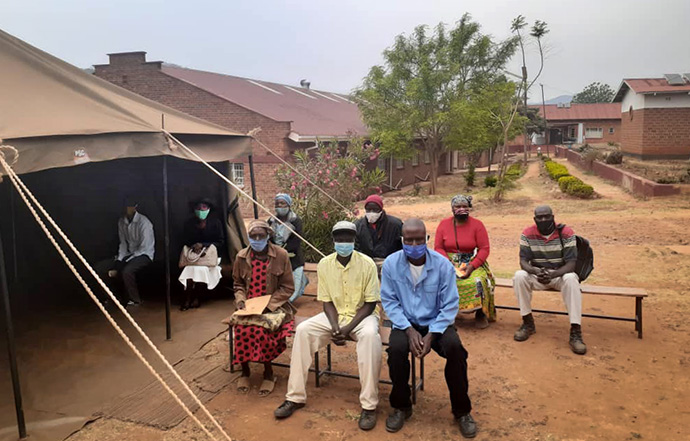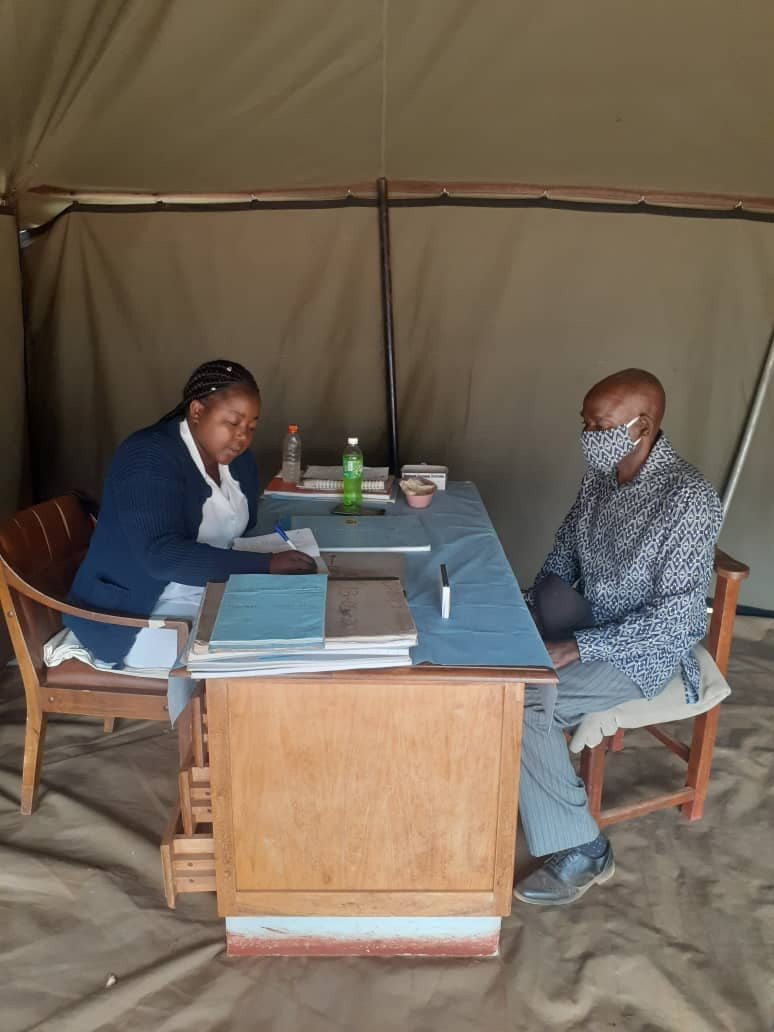
Patients wait to be seen inside and outside a screening tent set up at Old Mutare Mission Hospital in Mutare, Zimbabwe. The United Methodist Church’s mission hospitals are using the tents to screen and isolate patients to help stop the spread of the coronavirus. Photo by Kudzai Chingwe, UM News.
Now, amid a global pandemic, tents are being pitched to fight the coronavirus at The United Methodist Church’s mission hospitals.
Most health facilities in Zimbabwe lacked an area for COVID-19 screening, so some have erected tents to protect personnel and patients.
The Rev. Alan Masimba Gurupira, administrative assistant to Bishop Eben K. Nhiwatiwa, said two of the three United Methodist mission hospitals are using tents.
“Some are using them at screening, attending to outpatient (care) and for isolation of cases pending further investigation or transfer to referral hospitals,” Gurupira said.
Dr. Godwin Choga, district medical officer for United Methodist Mutambara Mission Hospital, said they have two tents at the gate and in the outpatient department.
“Two people are manning the screening tent at the gate … to help identify signs and symptoms of COVID-19,” said Choga. He said they document detailed information for COVID-19 contact tracing and management purposes.
Those suspected of being infected with COVID-19 are put in isolation in a tent set aside as an isolation ward, he said.
There have been more than 8,400 confirmed cases in the country and 246 deaths, according to the latest Johns Hopkins University tracking information.
Having a tent at the main gate helps to prevent the spread of the disease, said Annah Mujati, a nurse aide at Mutambara Mission Hospital.
Angela Macherechedze, acting matron and sister-in-charge for the family and child health unit at United Methodist Old Mutare Mission Hospital, said the outpatient department uses a tent donated by Hauna District Hospital.
“With COVID-19, we really need to be careful and manage these patients separately since it is highly contagious,” Macherechedze said.
She said there are many advantages to using tents outside the medical facilities.
“It is mobile and can be used in any area where there is a dire need. … It is good at providing enough ventilation. You can easily adjust it to suit your needs at any given time as compared to permanent infrastructures,” Macherechedze said. “A tent is easy to clean and sanitize to maintain hygiene.”
While staff and patients agree that having permanent infrastructure would be ideal, the tents offer an easy workaround, especially during an outbreak.
“What is important is to have a working place and save lives,” said Annah Kasiyandima, a patient at the hospital.
Portia Gogode, outpatient department nurse at Old Mutare, said having an extra tent to use as a patient waiting area also would be helpful.

Portia Gogode attends to patient Steven Nyakudarika, 73, inside a tent set up outside Old Mutare Mission Hospital in Mutare, Zimbabwe. Tents are being used to protect patients and staff during the pandemic. Photo by Kudzai Chingwe, UM News
“During outreach programs, a tent is easy to carry and to pitch. It provides the necessary privacy to both the patients and staff members. It can also be used as accommodation for staff members,” he said. “If there is a shortage or unavailability of infrastructures, a tent is the best tool to use.”
He said the main problems are temperature control and germs.
“When it is cold it is very cold and when it is hot it is very hot,” he said. “In addition, the groundsheet can harbor bacteria, but most are killed when cleaned using detergents and sodium hypochlorite.”
While the tents are a great option, Gurupira said, the cost is not manageable for most of the church’s institutions. None of the church’s 12 rural health clinics has a tent.
Melody Hove, sister-in-charge at the church’s Arnoldine Mission Clinic, said she wishes the clinic could afford a tent to use during the COVID-19 crisis. A tent would have allowed less congested consulting rooms and more comfortable working conditions, she said.
The clinic does not have enough rooms for screening and an outpatient department.
“We attend to one patient at a time at the outpatient department and we (counsel and educate) patients under a tree and there is no privacy in these areas,” she lamented.
Even when the pandemic is over, she said a tent would provide a place for monitoring children and health education.
The tents also have been lifesavers following disasters in the country.
Subscribe to our
e-newsletter
Like what you're reading and want to see more? Sign up for our free daily and weekly digests of important news and events in the life of The United Methodist Church.
Nelia Samhiri, stewardship chairperson for the Chimanimani East Circuit’s Ngangu United Methodist Church, lost her husband and house in the storm. Her son, Silence, was hospitalized for months due to injuries sustained during the storm.
“(With a tent), you quickly have a roof over your head as you try to come to terms with the calamities. It is fast to pitch. No need for many materials. One easily becomes independent. Having a tent is better than renting or squatting in someone’s house,” she said.
“However, when it is raining or when the weather is windy, we do not sleep fearing that it can collapse,” she said, adding that it has happened before.
She and her family have lived in the tent for more than a year. Her son, a 22-year-old college student, said life in the tent has been difficult, but the family is grateful to have somewhere to stay.
Godwin Mupuro, United Methodist Hartzell High School deputy headmaster, said when a fire burned eight classrooms and other buildings in 2019, the school was left with no option but to use tents as temporary classrooms.
“We managed to pitch tents which accommodated five classes of 50 children each and an office,” Mupuro said. “Lessons were conducted decently. The children were protected against bad weather.”
Chingwe is a communicator for the Zimbabwe East Conference.
News media contact: Vicki Brown at (615) 742-5470 or [email protected]. To read more United Methodist news, subscribe to the free Daily or Weekly Digests.
Like what you're reading? Support the ministry of UM News! Your support ensures the latest denominational news, dynamic stories and informative articles will continue to connect our global community. Make a tax-deductible donation at ResourceUMC.org/GiveUMCom.



